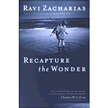


I heard Ravi Zacharias speak years ago when I was in Toronto, Ontario Canada, and I knew back then that he had a brilliant mind wholly dedicated to God. I heard him later on Focus on the Family, and only gain more respect for him each time. So when I saw this book with his name on it, I knew I had to read it.
It has been a treat!
Ravi has a fascinating way of examining a thought or idea very thoroughly, and explaining it with the most interesting, original little stories. I'm not nearly as educated or articulate, but I do enjoy following his thinking path.
I've collected a great assortment of excellent quotes too.
First, he points out that we all have had those ah-ha moments when we see what we were meant to be and recognize it as a good and desirable state. It's that inner sense of the highest, noblest perfection that makes us gasp with wonder and awe. Right there is that elusive wonder. We know it when we have it.
Because in our fast, routine and self-centered lives, we lose that wonder so quickly. But if we've experienced it once, we'll always pine for it - at least to a degree. Some resign themselves to "whatever will be, will be," but some of us earnestly seek after that wonder. To quote Zacharias, "Deep within every human heart throbs the undying hope that somebody or something will bring both an explanation of what life is all about and a way to retain the wonder." (p.13)
There are some rules to this search.
The author goes into various ways that do not work, then how to conduct our search correctly. We must see as through the eyes of a child with the gift of imagination. Unfortunately, he says, today's children have so many things to distract them, that they don't know how to use the gift they naturally have. Ravi mourns that loss of innocence and ability to wonder for our next generation, for their childhood has been cut too short.
He compares life to a story and storytelling. With that he tells some good short stories, which you must read for yourself! Especially, you want to read the one of the boy whom no one in the village would own, but who was sent on a journey to find the answers to his question.
"Wonder is one of those "possessions" that need disciplined guarding and thoughtful guiding." Zacharias says. Then he covers a number of wrong ways people go about pursuing and grasping at wonder. Sexual fantasy and sexuality do not lead to the true wonder. "The only way to transcend the physical and the sensual while retaining their essential features is to bind them to the sacred," adds Ravi. (p. 65)
"The one possessing the wealth must know its real value if the possession is to bring wonder." (p. 70). Materialism, obviously, does not generally lead to wonder.
Then he moves to what the wonder looks like, unwrapped.
Gratitude. "The gratitude that I am speaking of is not sporadic. It cannot be spent or exhausted. It is the transformation of a mind that is more grateful for the giver than for the gift, for the purpose than for the present, for life itself rather than for abundance. It values a relationship rather than any benefit made possible by the relationship. Even more, it is the capacity to receive, rather than the gift itself, to trust even when the moment seems devoid of immediate fulfillment. It is more than happiness. It is more than peace. In short, where there is no gratitude, there is no wonder." (p.87-88)
Yes, I agree wholeheartedly. Gratitude is absolutely key to wonder. He adds a good definition by Edwin Arlington Robinson that I want to remember; "There are two kinds of gratitude: the sudden kind we feel for what we take and the larger kind we feel for what we give." (p.93)
Which leads us to truth, another important feature of wonder, and the greatest gift ever given, when God gave His Son, Jesus Christ, for the sins of the world. If we really want to know what truth looks like, we need to look at, or study Jesus Christ.
There's still love, beauty and serenity to cover. Oh there's so much more that I must skip. You ought to read this book yourself!
Ah, let me touch on humility, yet another important part of wonder. I liked this line, that sums it up so well; "Only God is able to humble us without humiliating us and to exalt us without flattering us." (p. 119).
Heaven's purity is presented as a key part of wonder. I just love this definition; "Like a child who suddenly stops sobbing when he is clasped in the arms of his mother, such will be the grip of heaven upon our souls." (p. 131). Now that's what the Bible means when it says there will be no sorrow or weeping in Heaven! We will know we are loved and safe. Perfectly safe.
How to preserve the wonder? "Wonder is retained by wise pondering." (p. 156). "Wonder enriches you when you take the time to reflect and to ponder the greatness of our faith in Jesus Christ." (p. 159).
Prayer is another way to retain the wonder. Much as we know and read about prayer, and we understand that is where the victory in our lives lie, still we seem to drag our feet getting around to prayer. I have found this to be so true. I've struggled for years to strengthen this discipline, and have countless stories of how it has paid off, but if we ease off on the discipline, the victory and the wonder evaporate!
Meaningful prayer leads to worship of our wondrous God. This is where the best wondering happens!
There is much more dear Ravi Zacharias manages to say on this theme in this book's pages, but let me squeeze in one more quote; "God is like the light. Wonder is like the shadow. If you chase the shadow you will never catch up to it. It might even disappear. If you walk toward the light, the shadow will always pursue you. That is when the heart sings with gladness." (p.165)


Ruth Marlene Friesen
The Responsible One
Privacy Promises ~~
Sitemap
Ruthe's Secret Roses (official site)
©2001-2025 Ruth Marlene Friesen
Saskatoon, Saskatchewan, Canada